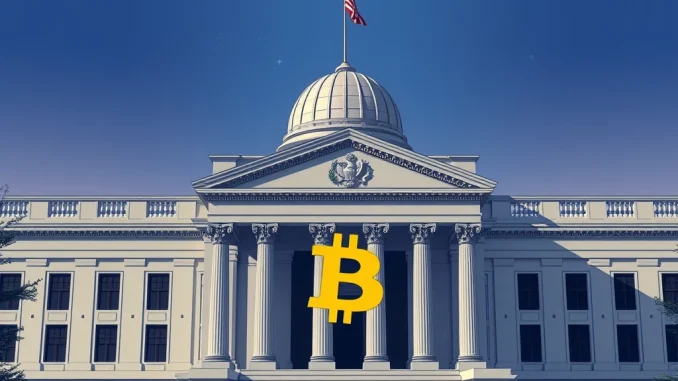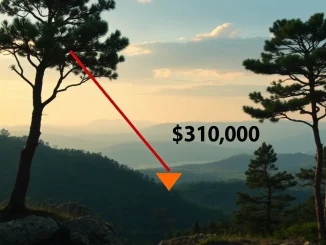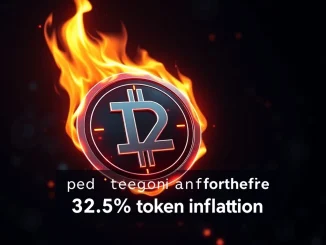
In a potentially groundbreaking statement for the cryptocurrency world, U.S. Treasury Secretary Scott Bessent has publicly acknowledged Bitcoin’s evolving role as a ‘store of value.’ This significant shift in official perception, reported by Watcher Guru on X, marks a pivotal moment for Bitcoin and the broader digital asset landscape. For years, the debate raged about Bitcoin’s true utility – was it just speculative digital gold, or something more? Now, a key figure in the U.S. Treasury is suggesting the former, adding weight to the argument for Bitcoin’s legitimacy as a long-term asset.
Why is the Treasury Secretary’s ‘Store of Value’ Comment So Important for Bitcoin?
This isn’t just another crypto influencer tweet; this is a statement from a high-ranking U.S. government official. Here’s why it carries weight and what it could mean for Bitcoin:
- Validation from Authority: Government acknowledgment, especially from a financial authority like the Treasury Secretary, lends credibility to Bitcoin. It moves Bitcoin further away from the ‘fringe asset’ perception and closer to mainstream acceptance.
- Institutional Investment Signal: Such comments can influence institutional investors who often look for signals of regulatory acceptance. If the U.S. Treasury recognizes Bitcoin as a store of value, it may encourage institutions to allocate a portion of their portfolios to Bitcoin.
- Reduced Regulatory Headwinds? While not a guarantee, this shift in rhetoric could suggest a potentially softer regulatory stance in the future. Governments are more likely to regulate and support assets they perceive as having legitimate financial roles, such as a store of value.
- Mainstream Narrative Shift: The narrative around Bitcoin is constantly evolving. This statement can help solidify the ‘store of value‘ narrative in the public and media consciousness, potentially attracting a new wave of investors seeking a hedge against inflation and economic uncertainty.
Bitcoin as a Store of Value: What Does It Really Mean?
The term ‘store of value‘ is crucial here. It’s an asset that is expected to maintain or increase its value over time, acting as a safe haven for wealth. Traditionally, assets like gold, real estate, and certain precious metals have been considered stores of value. For Bitcoin to be recognized in this category, it implies:
- Inflation Hedge: Bitcoin’s limited supply (21 million coins) is a key factor in its potential as an inflation hedge. Unlike fiat currencies, which can be printed by central banks, Bitcoin’s scarcity is hardcoded, making it potentially resistant to inflationary pressures.
- Safe Haven Asset: In times of economic turmoil or geopolitical instability, investors often seek safe haven assets. Bitcoin’s decentralized and censorship-resistant nature could make it an attractive option during such periods.
- Long-Term Investment: If Bitcoin is indeed a store of value, it positions it as a long-term investment rather than just a speculative trading instrument. This encourages a more mature and sustainable market for Bitcoin.
Challenges and Considerations for Bitcoin’s Store of Value Status
While the Treasury Secretary’s statement is encouraging, it’s important to maintain a balanced perspective. Bitcoin still faces challenges in fully solidifying its position as a store of value:
| Challenge | Description |
|---|---|
| Volatility: | Bitcoin’s price volatility remains significantly higher than traditional stores of value like gold. While volatility has been decreasing over time, it still presents a hurdle for some investors. |
| Regulatory Uncertainty: | Despite potentially softening rhetoric, regulatory frameworks around Bitcoin and crypto are still evolving globally. Uncertainty can impact investor confidence and institutional adoption. |
| Scalability and Technology: | While Bitcoin’s security is robust, scalability and transaction speed remain areas of ongoing development. Solutions like the Lightning Network are addressing these issues, but further advancements are needed. |
| Energy Consumption: | Bitcoin’s energy consumption, particularly in Proof-of-Work mining, is a concern for environmentally conscious investors. However, the industry is increasingly exploring renewable energy sources and more energy-efficient consensus mechanisms. |
Actionable Insights: What Does This Mean for You?
So, what should you do with this information? Here are some actionable insights:
- Do Your Research: The Treasury Secretary’s statement is a positive signal, but it’s crucial to conduct your own thorough research on Bitcoin and the crypto market. Understand the risks and potential rewards before making any investment decisions.
- Consider Long-Term Perspective: If you believe in the store of value narrative, consider Bitcoin as a long-term investment. Focus on the fundamentals and avoid being swayed by short-term market fluctuations.
- Stay Informed on Regulations: Keep abreast of regulatory developments in the crypto space. Regulations can significantly impact the market and your investments.
- Diversify Your Portfolio: While Bitcoin has potential, diversification is key in any investment strategy. Don’t put all your eggs in one basket. Consider allocating a portion of your portfolio to Bitcoin alongside other assets.
The Transformative Potential of Bitcoin’s Evolving Narrative
The U.S. Treasury Secretary’s acknowledgment of Bitcoin as a growing store of value is more than just a headline; it’s a potential turning point. It signals a maturing perception of Bitcoin within traditional financial circles and could pave the way for greater adoption, institutional investment, and potentially more favorable regulatory environments. While challenges remain, this landmark statement reinforces the narrative of Bitcoin as a legitimate and increasingly important asset in the global financial landscape. The journey of Bitcoin from a niche digital currency to a recognized store of value is a testament to its resilience and transformative potential. Keep watching this space – the evolution of Bitcoin is far from over.



